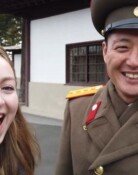Chinese dissident goes `Gangnam Style`
Chinese dissident goes `Gangnam Style`
Posted October. 27, 2012 06:25,
A 50-something man in China has looks and fashion that are not ordinary. With a bushy beard and a pot belly, he sports a black suit and pink shirt and starts to do the horse-riding dance made popular by Korean rapper Psy in his hit music video "Gangnam Style." The man`s clumsy dance with handcuffs attracts from around the world. Starring in the music video parody "Cao-Nima Style," is Ai Weiwei, 55, a Chinese artist and human rights activist.
"Cao-Nima" means "grass mud horse" but the Chinese characters are homonyms for a vulgar slur. Many Chinese Internet users use the word to criticize their government`s Internet censorship. Ai lampoons China`s Internet censors while doing the horse-riding dance. Active in installation art, architecture and many other genres, he is a star artist in the global community. ArtReview, a U.K. art magazine, put him third in its "Power 100" rankings this year and first last year. Criticizing China`s violation of human rights and freedom of speech through his artworks and direct actions, Ai was incarcerated for 81 days earlier this year on the charge of tax evasion. Many artists and human rights activists around the world held performances and demonstrations urging his release. Ai has emerged as a symbol of resistance in the global art world.
Though Ai helped design Beijing National Stadium, also known as the Birds` Next, for the 2008 Beijing Summer Olympics, he boycotted the opening ceremony in demanding freedom and democracy. He also supported a "citizen`s investigation" into student casualties in the Sichuan earthquake the same year and published the result. Beijing put his name on a blacklist after he raised suspicions over the government`s mismanagement of the quake and cover-ups of the number of casualties. A photo of him giving the middle finger to Tiananmen Square, which is called "China`s pride," also raised controversy in his country.
The Chinese government shut down his blog and bulldozed his studio before ordering him to pay back taxes of 2.4 million U.S. dollars. Beijing`s blatant oppression catapulted him to international fame. He continues to live in his Beijing home amid constant government surveillance, but the prices of his artworks have skyrocketed and he has been inundated with offers to hold exhibitions. The more pressure Chinese authorities put on him, the more influential he grows in the world. "Ai Weiwei Style" is a hot potato for the Chinese government.
Editorial Writer Koh Mi-seok (mskoh119@donga.com)







